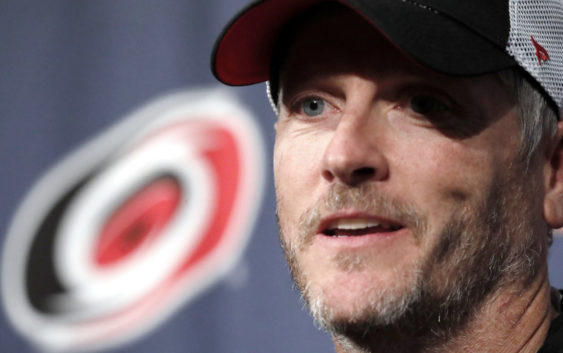- Couple accused of creating videos of young girls using hidden cameras at The Woodlands Mall, Hurricane Harbor
- Couple accused of creating videos with hidden cameras at The Woodlands Mall, Hurricane Harbor
- The Texanist: Texas Gets More Tornadoes Than Any Other State, but Don’t Freak Out
- U.S. Supreme Court says Texans can sue state for flood damage
- This is how many hurricanes NC State researchers predict this year
There’s no doubt that Tom Dundon is a hands-on owner. Here’s his goal for the Hurricanes.

Almost nine months and a full offseason into his ownership of the Carolina Hurricanes, Tom Dundon has shuffled the front office and the roster in a tenure that’s as hands-on as it gets. He has altered the minutest details, right down to the screen-savers on the flat-screen displays in the renovated locker room.
And yet the changes he really wants to make, the ones that will have a real impact, remain entirely out of his control. He describes the Hurricanes, not unfairly after nine years out of the playoffs, as irrelevant. Everything he has done has been, in his mind, with the goal of making them relevant, whether that’s wearing the old Hartford Whalers jerseys for two games or acting as the de facto general manager.
Even catching a lucky break in the draft lottery and being able to take a potential future star second overall in Andrei Svechnikov hasn’t changed that. Yet.
“If we lose, again, we’re going to be irrelevant next year. That’s the reality,” Dundon said. “That’s the reality in most sports. I was (in Dallas) when the Cowboys weren’t very good. No one cared. I was there when the Mavericks weren’t very good. No one cared. Same thing with the Stars. And when they’re good, people care. This isn’t a Raleigh thing. This is a people-want-to-be-associated-with-winning thing. Winning is fun. What we’ve got is different because some of our best players are teenagers, and we’ve got one of the youngest teams in the league. With the talent we’ve got, the question is, how long does it take?”
So something like the Hurricanes being left off the national TV schedule, save a single token game?
“I think we got what we deserved,” Dundon said. “I’m frustrated we don’t deserve it. When we deserve it, I believe we’ll be there.”
The process of getting there has not been what many people expected when Dundon bought the team in January. Despite his lack of a hockey background, he intended to bring what he saw as his decision-making skills – honed in the financial world of subprime auto loans – to the front office. That almost instantly brought him into conflict with general manager Ron Francis, who expected a degree of autonomy from his owner, seeking approval for his decisions instead of making those decisions alongside the owner.
Dundon’s awkward firing of Francis – he was first demoted, then dismissed – was one example of how Dundon’s methods in the business world did not easily apply to the sports world. He rarely fires people in his financial businesses, preferring to move them into other, less demanding (and less rewarding) jobs. But that doesn’t work in professional sports, where pride and title can be as important as compensation and there is a finite number of important jobs.
Others of his business tactics ruffled feathers the wrong way in the hockey world, like his search for a Francis replacement that saw him interview what seemed like every possible candidate while offering less than market value, only to settle on team president Don Waddell for the job. The hockey cognoscenti mocked the search; Dundon didn’t feel like there was anyone who rose above the crowd worth paying seven figures, especially when he expected to make the final hockey decisions himself based on the information he collected from the people around him.
So that’s how the Hurricanes’ new-look front office works: Waddell, deputies Rick Dudley and Paul Krepelka, head coach Rod Brind’Amour, Charlotte (AHL) coach Mike Vellucci, analytics guru Eric Tulsky, player personnel director Darren Yorke and many others all have various degrees of input into the process. Dundon tries to lead that group, or at least Waddell and Dudley, to some sort of consensus.
That process led to the trades this summer that brought in Dougie Hamilton and Micheal Ferland, the signings of Calvin de Haan and Petr Mrazek, the exit of Jeff Skinner and the decision to rebuild Scott Darling’s career rather than jettison him – the latter a personal crusade of Dundon’s.
It’s merely the beginning. By anyone’s estimation, the Hurricanes still have a long way to go.
“If one of our players goes to an All-Star Game or a World Championship, and someone asks, ‘Who do you play for?’ and they say the Hurricanes, right now that doesn’t mean what we want it to mean,” Dundon said. “I use the example of, if you said you played for the Golden State Warriors in the NBA seven or eight years ago, it wouldn’t have meant very much. And now, you’re bragging. I want, when people say Hurricanes, I want that to be bragging. We are starting on that process.
“I think Rod, and the style of play, and the fact that we have probably the most talent we’ve ever had, those are all good starts. It doesn’t happen because we say it. The world’s perception of us, we’re not on NHL Network and ESPN. We’re not being asked to play in the Winter Classic. Those are just truths. We’re not on national TV. We have to change all those things.”
Will it work? Only time will tell. But there’s no question that the owner’s fingerprints are all over this roster. It’s his team now, not just on the balance sheet, but from the ice on up. And the measure of success, as much as wins and losses, will be how much attention is paid.
Sports columnist Luke DeCock: 919-829-8947, ldecock@newsobserver.com, @LukeDeCock